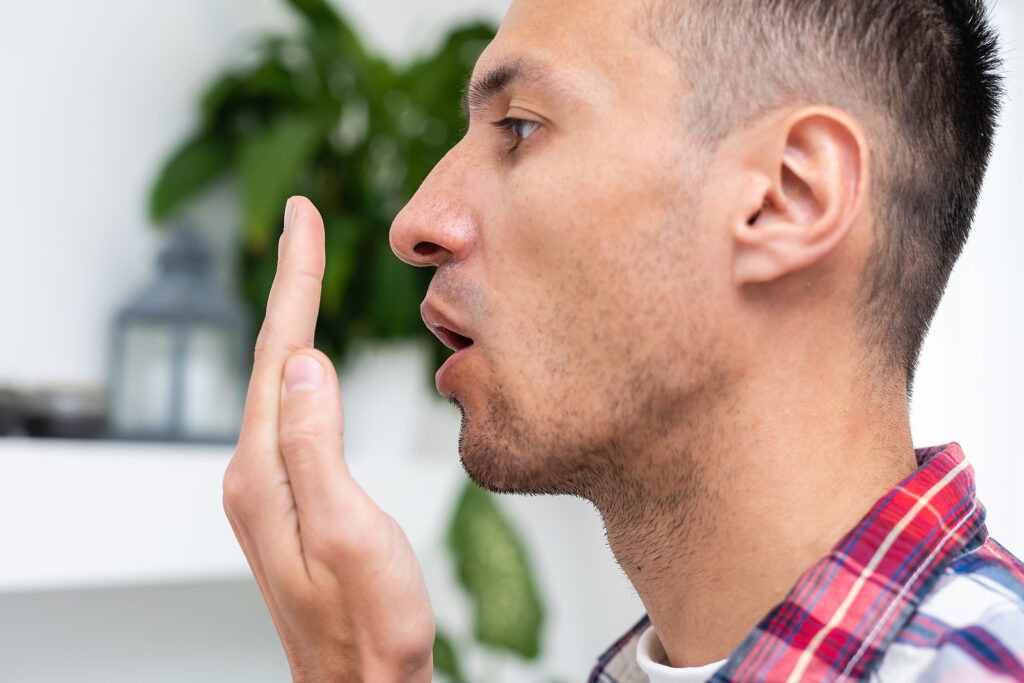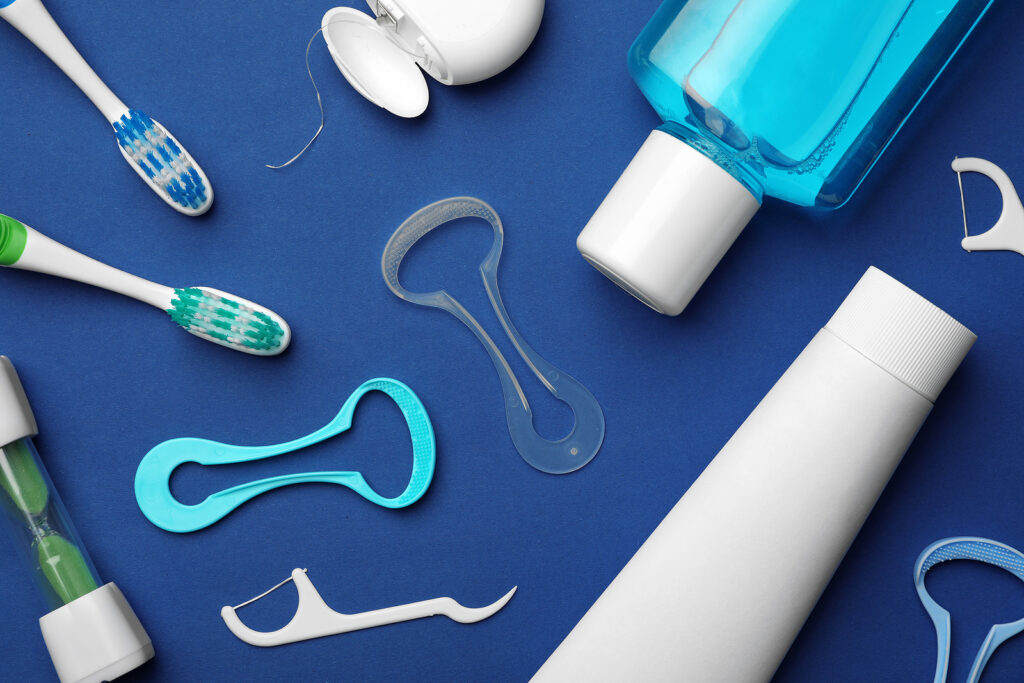October has arrived, and with it, National Dental Hygiene Month – a perfect moment to focus on keeping your breath fresh and your smile confident. It’s also Stoptober, a brilliant incentive to quit smoking, which not only boosts your overall health but can significantly improve your oral freshness. Bad breath, or halitosis, can make you self-conscious in conversations, whether catching up with friends or speaking at work.
At Park Dental Care in Nottingham, we’re here to help you understand what causes it and share simple ways to keep your mouth healthy and fresh. Let’s explore the causes of halitosis and how to banish it for good this month.
What Causes Bad Breath?
Understanding the root causes of bad breath is the first step towards preventing it. Halitosis can have several sources, ranging from lifestyle habits to underlying medical conditions.
- Smoking and Tobacco Use
Tobacco products are a notorious culprit for bad breath. Smoking leaves a lingering odour in your mouth and encourages the growth of harmful bacteria. These bacteria not only cause tooth decay but can also contribute to gum disease and dry mouth, both of which intensify unpleasant mouth odour. Beyond halitosis, tobacco use increases the risk of oral cancers, heart disease, and lung disease, making quitting a win for your breath and your overall health. - Poor Dental Hygiene
One of the simplest, yet most overlooked causes of bad breath is inadequate oral care. Failing to brush or clean between your teeth regularly allows plaque to accumulate on your teeth. Over half of people admit to only brushing once per day sometimes. Research shows that brushing for two minutes, twice per day is the minimum required for good oral hygiene. Over time, bacteria thrive in this environment, particularly at the back of the throat and between teeth where food particles can get trapped. These bacteria release foul-smelling gases, creating the persistent bad breath many people experience. - Dry Mouth
Ever noticed your breath smells worse in the morning? That’s because saliva, which naturally cleanses your mouth and removes odour-causing food particles, decreases while you sleep. Chronic dry mouth, or xerostomia, can result from issues with your salivary glands, certain medications, stress, treatments such as chemotherapy or just not drinking enough water. Without sufficient saliva, bacteria multiply more easily, and unpleasant odours develop. - Oral Infections
Persistent bad breath can sometimes signal an underlying dental problem. Tooth decay, gum disease, and mouth sores can all contribute to halitosis. In these cases, professional dental care is essential to resolve the root cause and restore fresh breath. - Food and Drink
Certain foods are infamous for leaving lingering odours, including garlic, onions, coffee and spicy foods. Foods that contain sulphur compounds not only stick to your tongue but are also absorbed into your bloodstream, sometimes causing a subtle scent from your pores. Alcohol and caffeinated drinks can also contribute to dry mouth, exacerbating bad breath.

Why Tackling Bad Breath Matters
Bad breath isn’t just a nuisance – it can affect how you feel in social situations, from casual chats to important meetings. I’ve seen clients who held back because they worried about their breath, and it’s so rewarding to help them feel confident again with straightforward solutions.
Beyond the social impact, persistent halitosis can point to issues like gum disease or infections, which is why addressing it early is crucial. At Park Dental Care, we believe fresh breath is about more than your mouth – it’s about feeling at ease and ready to shine in every moment.
How to Prevent Bad Breath
Most cases of bad breath are preventable, and with a few simple steps, you can enjoy a fresh, confident smile every day.
- Maintain a Thorough Oral Hygiene Routine
Brushing twice a day and cleaning between your teeth every day are fundamental. Don’t forget your tongue – bacteria can build up on its surface, causing odours. Tongue scrapers gently remove bacteria and food particles from the surface of the tongue – the main hotspot for odour-causing germs – while interdental brushes, our personal favourite, clean the tiny spaces between your teeth that toothbrushes miss. Using a mouthwash can provide an extra layer of protection against bacteria and leave your mouth feeling refreshed. - Stay Hydrated
Water is your mouth’s best friend. Drinking plenty of water throughout the day helps wash away food particles and bacteria that cause bad breath. Being well hydrated allows your salivary glands to make sufficient saliva to keep it fresh. Avoiding excessive alcohol, caffeinated beverages, and foods that contribute to dry mouth can also help maintain saliva flow and keep your breath fresh. - Avoid Tobacco Products
Quitting smoking not only improves your breath but also significantly reduces your risk of serious health issues. If you need guidance or support, our team can provide resources to help you quit. Vaping, while often seen as a “cleaner” alternative, can also dry out your mouth and disrupt its natural balance, leading to unpleasant smells. - Monitor Your Diet
While you don’t need to avoid all strong-flavoured foods, being mindful of what you eat can make a difference. Brushing, flossing, chewing sugar-free gum and rinsing after meals with strong-smelling foods like garlic and onions can help prevent lingering odours. Incorporating crunchy fruits and vegetables like apples and carrots can also help naturally clean your teeth. - Visit Your Dental Hygienist Regularly
In the UK, a third of adults don’t regularly visit a hygienist, putting them at increased risk of gum disease and associated unpleasant symptoms. If you notice that bad breath persists despite good oral hygiene, it may indicate an underlying issue such as gingivitis or periodontitis. Regular hygienist appointments are key to diagnosing and addressing problems early. At Park Dental Care, our compassionate team takes the time to understand your concerns and tailor treatments to your needs, ensuring your oral health – and your breath – remains at its best.
We’re proud to be a certified practitioner of Guided Biofilm Therapy (GBT), a professional cleaning technique designed to tackle the bacteria that cause bad breath. GBT gently removes biofilm from teeth, gums, and hard-to-reach areas, leaving your mouth cleaner, healthier, and fresher for longer. Combined with good home care, it’s one of the most effective ways to keep halitosis at bay and your smile confident.

Make This Month Count
National Dental Hygiene Month, paired with Stoptober’s push to quit smoking, is a fantastic opportunity to refresh your oral health habits. I love seeing clients embrace simple changes that make their smiles fresher and healthier – it’s about feeling confident in every conversation, from coffee catch-ups to big presentations. Whether it’s brushing smarter, avoiding tobacco, or booking a hygiene visit with our cutting-edge GBT treatment, these steps prevent bigger problems and keep your smile shining. At Park Dental Care, our friendly team is here to support you with expert advice and gentle care in our welcoming Nottingham practice.
Call us at 0115 9101447 or book online to kick off October with a fresh, confident smile!






